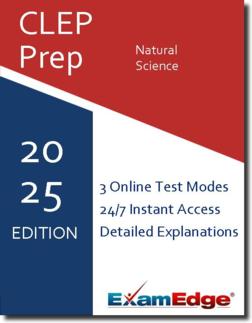CLEP Natural Science Practice Tests & Test Prep by Exam Edge - Additional Information
Based on 34 Reviews
- Real Exam Simulation: Timed questions and matching content build comfort for your CLEP Natural Science test day.
- Instant, 24/7 Access: Web-based CLEP Natural Science practice exams with no software needed.
- Clear Explanations: Step-by-step answers and explanations for your CLEP exam to strengthen understanding.
- Boosted Confidence: Reduces anxiety and improves test-taking skills to ace your CLEP Natural Science .

CLEP Natural Science - Additional Information
Education doesn't always occur in a classroom setting. If you've mastered key concepts and are hoping to receive college credit for the material you already know, CLEP tests – also known as College Level Examination Program – could be the answer. Those who perform well on CLEP tests can save significant time and money by getting credit for the concepts they have already learned. CLEP Natural Science practice tests can help prepare learners for the exam.
What is the CLEP Natural Science test?
Created to give credit to learners who have mastered concepts outside academia, the CLEP Natural Science test is popular among adult students. Just as Advanced Placement and International Baccalaureate tests give college credit to high school students for their knowledge of a given subject, CLEP tests reward students who have mastered key ideas outside of the classroom. Taking CLEP Natural Science practice exams is a good way to determine how you'd fare on the real thing.
Who should take the CLEP Natural Science test?
Anyone hoping to bypass the time and expense associated with college courses should consider taking the CLEP Natural Science test. While favored by non-traditional students, CLEP exams can be taken by anyone who feels confident in their mastery of a given subject area. High school students, adult learners, veterans, college students and professionals all take CLEP exams. No matter your educational background, CLEP Natural Science exam prep can provide you the silver bullet you need to ace your test.
How much does the CLEP Natural Science test cost?
CLEP Natural Science test registration is $87. In some cases, schools charge an additional $15 administration fee. Military service members do not have to pay for CLEP registration, but they may be subject to the administration fee. While the sticker price of the CLEP tests may seem off-putting, you'll save substantially on the tuition you would've paid for the course you're testing out of.
How many questions are on the CLEP Natural Science test?
There are 120 multiple choice questions on the CLEP Natural Science test. These must be answered within the 90-minute testing window. CLEP Natural Science test prep should be taken seriously in the weeks leading up to the real exam. Given how much time and money a passing CLEP score could save you, it's worth doing a little extra work ahead of the test to ensure you do well.
About half of the 120 questions of the CLEP Natural Science test are about biological science. You'll be tested on your knowledge of evolution, cell organization, and patterns of heredity. For the second part of the test, you'll see questions about physical science. Prepare by studying chemical elements, the solar system, laws of thermodynamics and the Earth's geologic history.
How to prepare for the CLEP Natural Science test
Exam Edge can help give you the advantage you need to pass your CLEP Natural Science test. Our CLEP Natural Science practice tests give you an idea of how you might score on the exam if it were happening today. Just familiarizing yourself with the format and structure of the test can improve your confidence levels. Some students who are passionate about natural science are eager to take the CLEP and bypass entry-level courses. Others are less enthusiastic and hope to pass the CLEP so they do not have to sit through a course they don't find valuable. Regardless of how you feel about natural science, it's important to employ the right study strategy to pass your CLEP.


